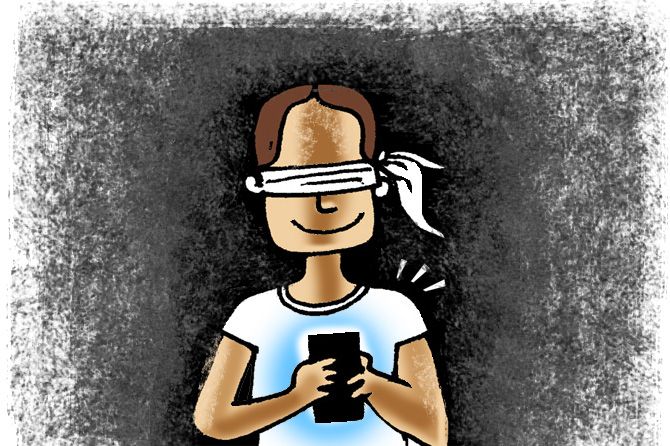 | « Back to article | Print this article |
Are you an innocent smartphone user in a perilous online world, asks Geetanjali Krishna.
Illustration: Dominic Xavier/Rediff.com

It’s a jungle out there and we’ve no weapons!
I often get the feeling that, as a society, we’re moving so fast that not only our cultural norms but also our laws are unable to keep up.
Take cyber safety, for instance.
Today, several schools offer cyber security workshops, ensuring that teenagers at least know about the dangers of sharing information online.
What about people older than them, who grew up in a more digitally innocent era? They have the money to buy the best phones, but are unaware of the dangers lurking within.
A couple of days ago, Rakesh Kumar, a Delhi-based driver, came to me for advice on something like this.
“My 24-year-old niece loves to chat with her friends on WhatsApp and Facebook,” he said.
He and the other elders in the family indulged her with the latest model of a popular smartphone, after which the girl began using its more superior camera to take selfies and constantly change her display picture on social media.
She had no clue that these innocent pictures could be downloaded and used any which way by anyone who knew her number.
Then, the first envelope arrived.
It was a nondescript brown cover with six photographs of Kumar’s niece.
The girl realised that these were some of the display pictures she had uploaded on WhatsApp in the last three months.
The elders in the family, Kumar included, were all school dropouts, and not particularly internet-savvy.
“We didn’t know how to deal with such online harassment,” Kumar said. “I changed her SIM card hoping that this would reset her WhatsApp account.”
Of course, the WhatsApp account remained active.
The next envelope contained a threatening letter and more pictures. This time, in one of them, she was nude.
The sender said he had unlimited access to all her photos and, the next time, he’d send them to others in their community.
The conservative Madhya Pradesh family was shocked and terrified that this would ruin the girl’s chances of a good marriage -- even though it was clear that her head had been morphed on someone else’s body.
Kumar had come to ask if they had any legal recourse.
A quick search on the internet told me that, although the information technology law of 2000 could offer a way ahead, the sort of harassment that Kumar’s niece was facing was troubling but hard to pin down.
“We can’t wait for something worse to happen,” he muttered worriedly as he left.
Later that night, he called to give me good news.
“This evening, we asked other youngsters in our mohalla if anyone had been hanging around my niece,” he said.
Two mentioned the same boy.
Kumar and his brothers went to the boy’s house, requested his parents to examine his smartphone and, sure enough, found all their niece’s pictures on it.
The mortified parents, both illiterate, cried, saying that they kept track of their 17-year-old’s offline habits but simply couldn’t do the same for what he did online.
“Eventually, we decided to let it go as they were our neighbours and the boy promised never to do this again,” Kumar said. “So we gave him a couple of tight slaps and left.”
I’m glad the story ended well for Kumar but a thought continues to rankle.
While smartphone and internet penetration is growing at an incredibly fast pace, most users remain unaware of how to protect themselves online.
The problem is exacerbated in users belonging to illiterate households. The internet takes them places their families can’t even conceive of.
Everyone is rushing to buy the latest smartphones, unaware that each app they download takes them deeper, blindfolded into a jungle with hidden pitfalls -- and they’ve no weapons to protect themselves.